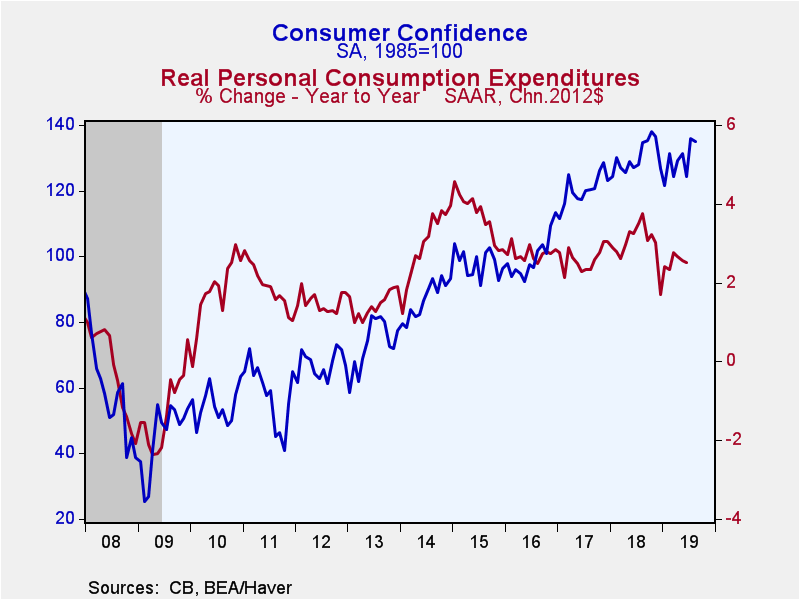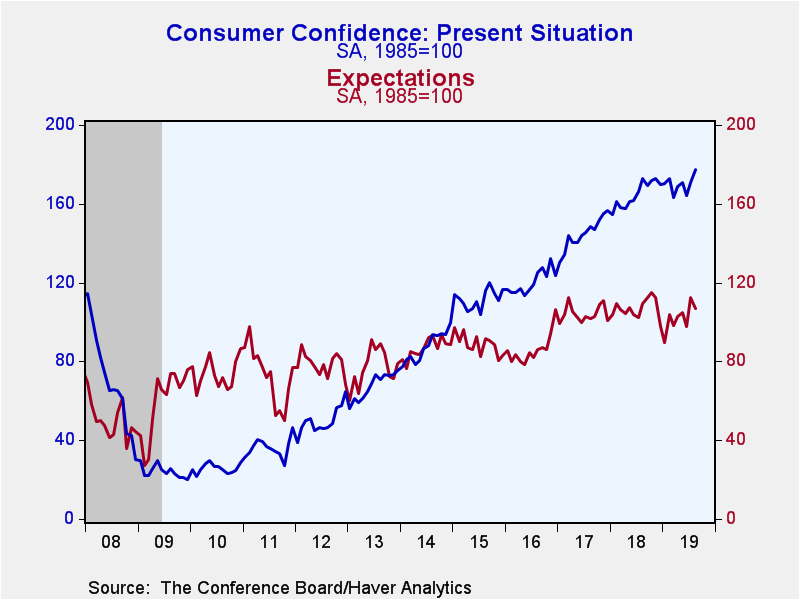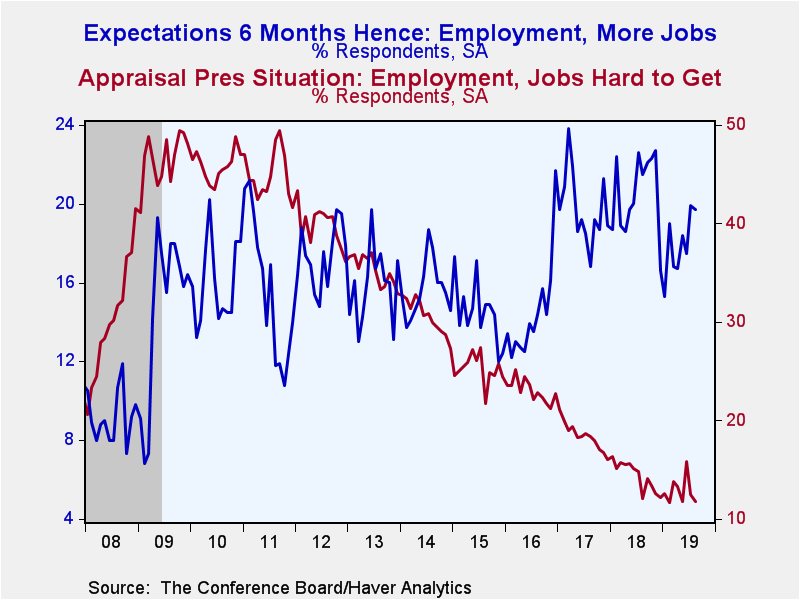 Global| Aug 27 2019
Global| Aug 27 2019U.S. Consumer Confidence Little Changed Overall but Components Mixed
Summary
The Conference Board's Consumer Confidence Index edged down 0.5% (+0.3% y/y) in August to 135.1 (1985=100) from 135.8 in July. Despite this slight monthly decrease in the index, it was stronger than the estimate in the Action [...]
The Conference Board's Consumer Confidence Index edged down 0.5% (+0.3% y/y) in August to 135.1 (1985=100) from 135.8 in July. Despite this slight monthly decrease in the index, it was stronger than the estimate in the Action Economics Forecast Survey, which looked for a drop to 128.0 after a sizable increase in July.
Results were very mixed among the major ingredients in the survey. The present situation is seen as better, at 177.2, up 3.7% (+2.5% y/y) from 170.9 in July. But expectations declined 4.8% (-2.1% y/y) to 107.0 from 112.4 in July.
And differences by age group are quite marked. People under 35 are much more optimistic in August, with their index at 150.3, up 6.8% from July (+10.7% y/y); this is the highest reading ever in this index, which dates from January 1980. Respondents aged 35-54 became more pessimistic, however, as their confidence fell 4.2% in August to 136.5 (-0.6% y/y), and there was no change at all in the confidence of people over 55, with their index at 127.8 (-3.2% y/y), exactly the same as in July.
The present conditions appraisals were clearly positive: the share of people believing business conditions are "good" rose to 42.0% from July's 39.9%, as those experiencing "bad" conditions fell to 9.8% from 11.2%. The jobs market is still perceived to be quite strong, with the percentage of respondents who believed jobs were plentiful rising to 51.2%, the highest since July 2000. Jobs were viewed as hard to get by 11.8% of respondents, the lowest since July 2000.
On the expectations front, the portion of respondents expecting business conditions to improve decreased to 21.9% from July's 24.0%, while the share looking for some deterioration increased to 10.0% from 8.4%. There is little change in expectations for more jobs, at 19.7% in August versus 19.9% in July. However, the share looking for fewer jobs over the next six months rose to 13.6% from 11.1% previously. More income is expected by 23.8% of respondents, down from 24.9%, while the share looking for less income also decreased, by just a bit, to 5.8% from 6.6% in July.
People look for somewhat more inflation, with expectations for the y/y increase in the CPI back up to 5.0% in August from 4.6% the month before. Survey participants do tend to expect interest rates to decline, as indicated by 27.3% of them, up from 15.9% in July, while the share expecting rates to increase fell to 39.7% from 49.6%.
The share of respondents planning to buy a house fell to 6.0% from July's 7.4%, with those looking specifically for a new house fell back to 1.4% from July's 2.0%; notably, this marks a revision of the original July number of 2.3% which was among the highest ever. The current 2.0% figure is still the largest since 2007, that is, before the Great Recession. The percentage who plan to buy a major appliance eased to 51.6% in August from 52.4% in July. And the share who plan to buy a car rose slightly to 13.3% from July's 12.5%.
The Consumer Confidence data are available in Haver's CBDB database. The total indexes appear in USECON, and the market expectations are in AS1REPNA.
| Conference Board (SA, 1985=100) | Aug | Jul | Jun | Aug Y/Y % | 2018 | 2017 | 2016 |
|---|---|---|---|---|---|---|---|
| Consumer Confidence Index | 135.1 | 135.8 | 124.3 | 0.3 | 130.1 | 120.5 | 99.8 |
| Present Situation | 177.2 | 170.9 | 164.3 | 2.5 | 164.8 | 144.8 | 120.3 |
| Expectations | 107.0 | 112.4 | 97.6 | -2.1 | 107.0 | 104.3 | 86.1 |
| Consumer Confidence By Age Group | |||||||
| Under 35 Years | 150.3 | 140.7 | 116.4 | 10.7 | 133.7 | 130.2 | 122.4 |
| Aged 35-54 Years | 136.5 | 142.5 | 133.5 | -0.6 | 132.2 | 123.5 | 106.2 |
| Over 55 Years | 127.8 | 127.8 | 119.6 | -3.2 | 126.3 | 112.9 | 84.6 |
Carol Stone, CBE
AuthorMore in Author Profile »Carol Stone, CBE came to Haver Analytics in 2003 following more than 35 years as a financial market economist at major Wall Street financial institutions, most especially Merrill Lynch and Nomura Securities. She had broad experience in analysis and forecasting of flow-of-funds accounts, the federal budget and Federal Reserve operations. At Nomura Securities, among other duties, she developed various indicator forecasting tools and edited a daily global publication produced in London and New York for readers in Tokyo. At Haver Analytics, Carol was a member of the Research Department, aiding database managers with research and documentation efforts, as well as posting commentary on select economic reports. In addition, she conducted Ways-of-the-World, a blog on economic issues for an Episcopal-Church-affiliated website, The Geranium Farm. During her career, Carol served as an officer of the Money Marketeers and the Downtown Economists Club. She had a PhD from NYU's Stern School of Business. She lived in Brooklyn, New York, and had a weekend home on Long Island.
More Economy in Brief
 Global| Feb 05 2026
Global| Feb 05 2026Charts of the Week: Balanced Policy, Resilient Data and AI Narratives
by:Andrew Cates









